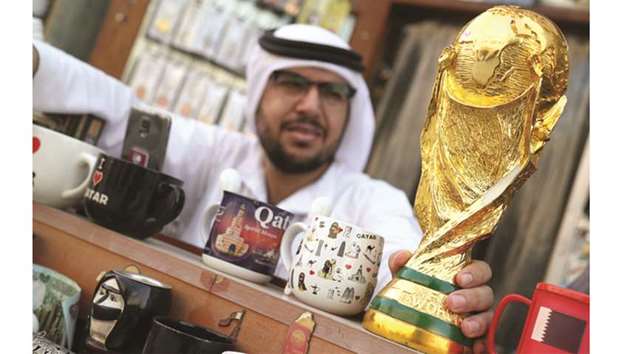Here’s a lowdown of what to expect from Arab world’s first ever World Cup
With the Russian World Cup concluding yesterday, the attention has turned to Qatar which will host the 2022 edition. Qatar won the bid to host the world Cup in 2010 beating off stiff competition. In the eight years since then Qatar has embarked on a massive development drive, building gleaming stadiums, roadways, a metro system and other infrastructure.
Here are some of the facts about Qatar.
HOST
The Gulf nation of Qatar is the smallest host of the showcase tournament, covering an area of 11,500 square kilometres and with a population of 2.7 million, some 600,000 of whom live in the capital, Doha. Rich with natural gas and oil reserves, Qatar has the highest per-capita income in the world.
Ruled by His Highness the Amir Sheikh Tamim bin Hamad al-Thani, Qatar is the first nation from the Muslim world chosen to host the world’s greatest sporting showpiece.
DATE
Local officials originally wanted to stage the tournament at its traditional June/July slot but, even though organisers pledged cooling technology in all stadiums, the desert climate, with summer temperatures of more than 40 degrees Celsius, prompted FIFA in 2015 to move the tournament to the late European autumn, when temperatures average 25-30 degrees. FIFA announced the dates for the tournament on Friday — November 21 to December 18.
VENUES
Qatar plans to stage the tournament in eight stadiums. The biggest venue is under construction in Lusail City, some 15km north of Doha. The stadium will seat more than 80,000 people and host the opening match and the final. Al Bayt Stadium in Al Khor, 35km north of Doha, is to seat 60,000. All other arenas are to have a capacity of 40,000 for the World Cup: Al Rayyan 20km east of Doha, Al Wakrah 15km south of the capital, and the four Doha venues. Organisers pledge to reduce the size of several stadiums post-World Cup for use in the domestic league and as training facilities.
EXPANSION
The South American confederation has requested a possible expansion to 48 teams. Organising committee (SC) assistant secretary-general Nasser al-Khater has said it would be “doable” but that a change must be decided upon by early 2019, before the start of qualifying. Options include the familiar 32-team group stage after 16 teams gain direct entry and the others are decided in 16 play-off matches; or using the 2026 format with 48 teams in 16 groups of three teams and knock-outs starting with the last 32. An expansion would however lead to an earlier start.
FANS/FAN-FEST
Qatar hopes to lure tens of thousands of fans to the tournament but the presence of huge contingents of mostly Latin American fans in Moscow has already prompted them to rethink the site of the main fan fest in Doha’s Al Bidda Park, near the central harbour promenade.
Al-Khater acknowledged that “a city can be very quickly overwhelmed by big crowds” but has pledged “a city World Cup,” which is “going to be present everywhere”.
He also said that Qatar hopes to attract more European fans than Russia because the Qatar World Cup is “unique and a very different type of World Cup.”
It is not yet decided whether Qatar will also introduce a fan ID system because it has visa-on-arrival arrangements with 90 countries.
HOME TEAM
South Africa in 2010 are so far the only hosts who have failed to survive the group stage but Qatar would be keen to avoid the same fate in four years’ time. Automatically entered as hosts, Qatar’s national team will make its debut at the global stage after never previously qualifying.
Qatar are currently ranked 98th in the FIFA list and al-Khater said it would be “a phenomenal triumph” if Qatar could emulate Russia by reaching the quarter-finals. There has been speculation that former Spain great Xavi could become coach.
SPORT
The World Cup is the biggest sports event ambitious Qatar has landed so far. The country also hosted the 2006 Asian Games and has staged or been awarded world championships in major sports, including handball (2015), boxing (2015) cycling (2016), gymnastics (2018), athletics (2019) and swimming (2023). Doha also hosts annual men’s and women’s tennis tournaments.
The Aspire Sports Academy is a popular training site for athletes and teams from within the country and abroad.
Arguably Qatar’s best-known athlete is Mutaz Essa Barshim, the reigning high-jump world champion and 2016 Olympics silver medallist.

A replica of the World Cup trophy is seen at a shop in Souq Waqif in Doha on Friday. (Reuters)
